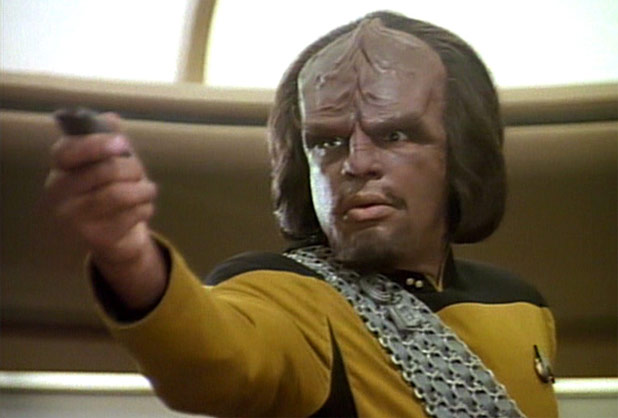Everything You Always Wanted To Know About Worf (But Were Afraid To Ask)

We love Worf. Come on, who doesn’t? So it was a pleasure for us when we stumbled upon a recent LA Times interview with his human counterpart, Michael Dorn. They decided to commemorate the 25th anniversary of Star Trek: The Next Generation by getting to know the man behind the mask. They discuss everything from the obvious makeup issues that he had to deal with all the way to his thoughts about the choice for TNG to have a very different kind of captain than Kirk.
Here are a few excerpts from the interview:
HC: The makeup and your performance combined to create a truly memorable television character — but there are frustrations for actors that come with such a deep and prolonged disguise. Were you to able to take the role and the success for what it was, or did it present a nagging issue for you?
MD: It was an issue. I wasn’t evolved enough to take it for what it was at that point. I knew that it could go either way; it could be a wonderful thing or it could be a problem for my career. You just don’t know. On one hand, you’re in makeup, nobody knows who you are, and after a few years you come out and you have the prestige of being on a nationally produced television drama, and that can’t hurt — but at the same time you come off and people don’t recognize you. You come off the show and they’re like, “Where have you been?” It would be either one, but the one thing that I knew was that it was good to have a job. That kept me going. Being on a series, as an actor, you’re in the top 0.01 % of the Actors Guild, and that’s something you can’t sneeze at it.
And…
HC: One of the things that you brought to Worf was an endless but endearing exasperation. Was that there on the page, or did you add that as an actor’s choice?
MD: That was totally by my invention. I realized by looking at the people on the bridge that they’re all great friends and they’re out in space and they’re traveling, and it was all so pleasant. I decided that I wanted to be the opposite. I made my guy the guy that was pissed at everything. If someone looked at him sideways, he was mad. So that’s where they got all that. You know, I really gravitated a lot towards Worf. He was a good guy; he was honorable and brave; he evolved; he didn’t stay stagnant over the years. I liked that. The loyalty and honor were very appealing to me. The other thing too is that it’s not a blind loyalty to anyone or anything. And he’s right all of the time — all of the time — because he’s always true to himself.
And…
HC: There was a choice with “Star Trek: The Next Generation” to go with a very different sort of captain, to steer away from a “Captain Kirk 2.0.” How essential was that choice to the show’s success?
MD: It was good decision, definitely. I was skeptical when I met Patrick [Stewart] and saw him. I thought, “Well, this isn’t Kirk. This isn’t even near Kirk.” But once I started acting with Patrick I knew immediately it was the perfect decision. With my character, bringing a Klingon on and making him part of the bridge, that was an afterthought. If you ask my buddies on the show, I wasn’t even there for the original cast photo and for the first filming and all of that stuff because Worf was an afterthought. It couldn’t have been more fun to do this, but when I was cast, nobody knew me on the stage — I wasn’t introduced to anybody, there was no “Hey, guys, this is going to be Worf.” I just showed up one day, in makeup, and started working.
There are a bunch of other interesting tidbits to discover, so be sure to read the full interview here.
(Source Hero Complex)

